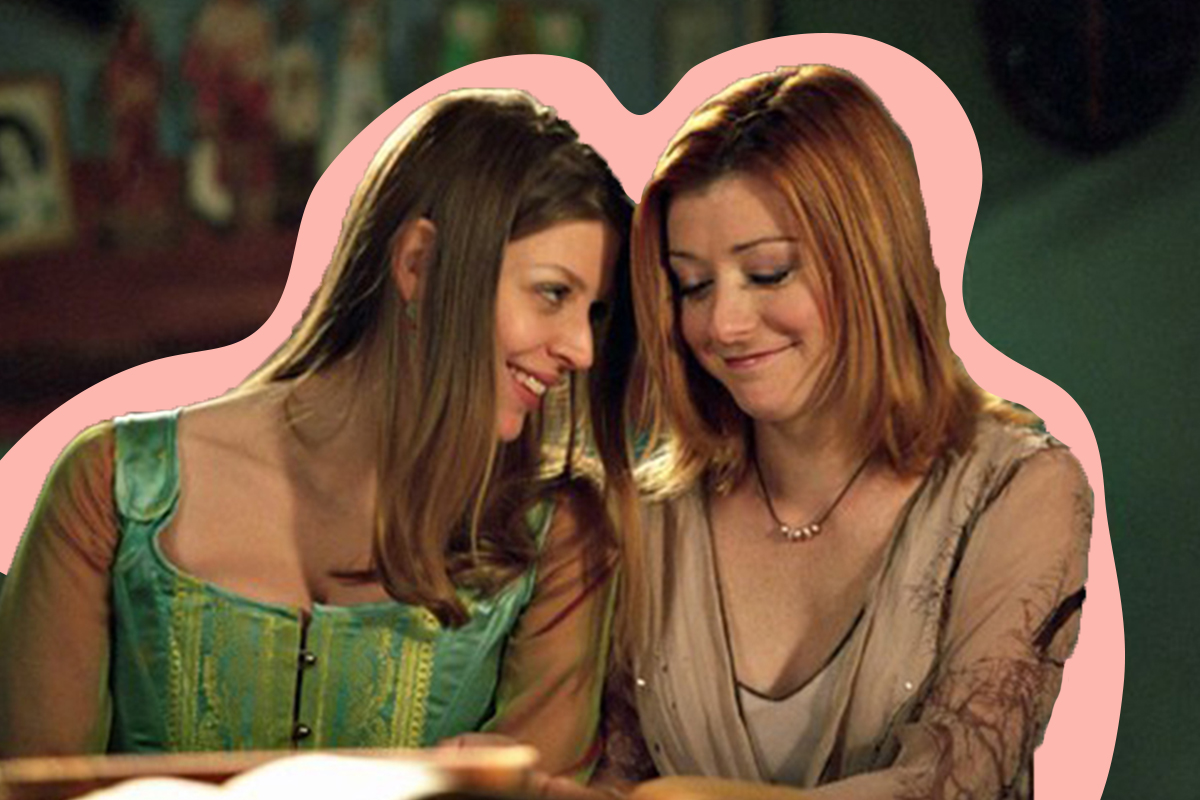I began watching Buffy the Vampire Slayer as an insecure, unstable 17-year-old. I was having trouble figuring out my values and sense of self. Around this time, I was in the process of being diagnosed with mental illnesses, which attributed to my attachment to and confusion with labels. One of the labels I struggled with was my religion.
I grew up in a supposedly non-religious household — my mother is Jewish; my father was raised Christian and is now atheist. Feeling like I had to decide what group to be a part of and which religion to choose, I felt isolated from both Judaism and Christianity. I didn’t have a bat mitzvah and barely celebrated any holidays of either religion. People often asked me if I was Jewish, probably because of my curly, frizzy hair. My go-to response was “I’m half Jewish… but I don’t practice.”
The truth is, I wanted desperately to connect more with Judaism but I didn’t have the courage to face what my dad might think of that idea. I didn’t know how accepting of it he would be. My mom, on the other hand, liked having me on her side when it came to arguments about religion, so I figured she would be glad to help me. However, I was still scared to approach the topic with her. And when I tried to fit in with other Jewish kids in my area, I was the outsider.
I attended a Catholic high school because it was closer to my house than my city’s public school, which made me feel even more conflicted than I already was about religion. I grew up in a pretty diverse city, so not everyone there was religious — or even Christian at all. The few Jewish kids at school were also not extremely observant. I actually felt like I fit in at Catholic school more than I did around my Jewish family friends because at school I felt “Jewish enough.” However, I continued to spend a lot of time around my other Jewish friends, feeling totally insecure.
But then there was Buffy.
One of the main characters in Buffy The Vampire Slayer, Willow Rosenberg, is Jewish. In the show, she talks about her Jewish heritage a few times, but also starts practicing witchcraft. Watching this Jewish character practice witchcraft showed me that there are many ways to be Jewish – not just by being religious, and not just by following one tradition. Here was someone showing me that I don’t need to practice Judaism every day to accept that I am part of a Jewish family and I therefore am Jewish. I didn’t need to include the caveat that I’m “half Jewish.” I am allowed to be proud of my heritage even if I didn’t grow up knowing a lot about it. And I don’t need to act a certain way to prove my identity to non-Jewish people.
Willow, in addition to being Jewish, is a lesbian, like me. At 17, I had recently accepted that label, which is initially what made it easy for me to relate to the character. When Willow had her first onscreen kiss in season five with Tara, her girlfriend, it was revolutionary. At the time, when homosexual relationships were written into shows, the most intimacy you’d ever see was a lone kiss. The romantic interest was usually used as a prop for the main character to come out as gay, never to be seen again after the deed was done. In Buffy, Tara and Willow dated for a whole season before making out on screen, making it one of the first shows to depict a naturally progressing lesbian relationship, and that media representation truly resonated with me. I was out to my parents and friends but wasn’t completely familiar with what it meant to be gay. I had never seen a positive lesbian main character on television before, so learning that I could be in a loving, gay relationship and be proud of my sexuality gave me hope.
There was also the fact that Sarah Michelle Gellar, the actress who plays the hero of the show, Buffy Summers, is Jewish. While the character Buffy herself is not Jewish, I love how this Jewish actress was able to invert the “dumb blonde” trope: she is powerful, smart, spunky, and fights evil. Between Buffy and Willow, the amount of capability those two characters embody is what ultimately helped me realize my own strength.
Years later, as a 20-year-old, I continue to find comfort in the relatability of Buffy The Vampire Slayer. I still struggle with my identity, but in different ways. I have a long way to go before I am fully secure with who I am, but the way I look at my identity has changed; I have accepted my labels but am still figuring out my values. The show’s positive representation of characters I can relate to makes me happy that I can count on a show like BTVS to continue to inspire others to be proud of their identity as well.



